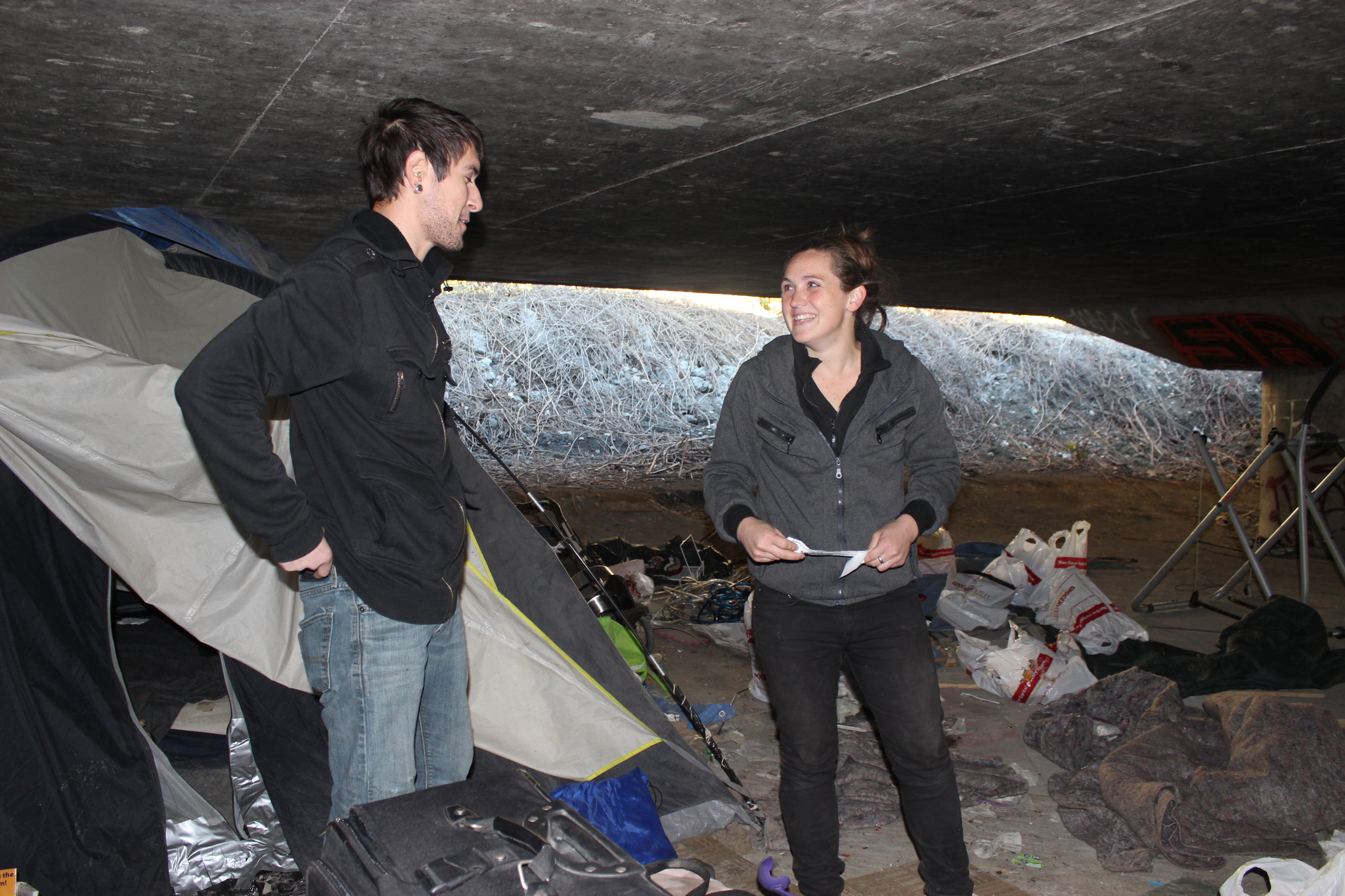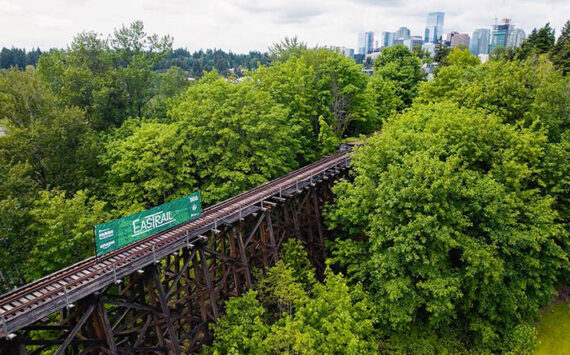Since five people were shot under I-5 in January, authorities led by Mayor Ed Murray have been fixing to clear the stretch of encampments beneath and along the highway known as the Jungle. Formerly home to hundreds of campers, the Jungle’s population has dwindled to only a few dozen aften months of threatened eviction. This morning, that eviction proceeds. Last night, I took a final walk through the pre-eviction Jungle.
Jerry Dean is a tall, broad shouldered man with a deep voice, dreadlocks and a sardonic laugh with which he deflates the absurdities around him. Previously a resident of the Jungle, Dean like nearly a hundred other former Jungle campers now lives in a tent among tents in the Field, adjacent to the Jungle. This is one of the places authorities have been sending campers—a sort of tacitly authorized encampment.
The Field. Photo about 2 weeks old. pic.twitter.com/pMQEqQMxhl
— Casey Jaywork (@CaseyJaywork) October 11, 2016
We’re standing in a crude walkway between cloth-and-pole homes, early in the evening of Monday, October 10th. Dean wears a black jacket and a broad, long chain necklace. Rays of deep gold sunlight twinkle through to us between the branches of firs at the top of a hill beside an elevated highway off-ramp. As we talk, men repeatedly stop by to greet or consult with him.
“Dealers,” Dean is saying, “they’re homeless guys who go through garbage and try to take what’s valuable. They tear up our trash. They’re worse than damn raccoons.”
But despite this and other annoyances, life is comparatively good in the Field, he says. With porta-potties and dumpsters, the rats endemic to the Jungle are absent, which makes it easier for Dean to sleep easy at night. “Even if you hate homeless people, give them dumpsters,” he says, “because it’s going to make it a better place for you, because of the rats. Give them Honeybuckets. You don’t want them throwing bags of poop inside the dumpster in a Burger King bag.”
As he did in our previous interview, Dean advances a transcendentalist critique of the mainstream society homeless campers have fallen out of. There’s something to be said, Dean says, for living on the fringe, outside capitalism’s metabolism. “These people, they’re at peace,” he says, motioning to the campers. “The people that’s out there doing the nine to five,” he says, motioning to drivers on the many swooping highway ramps around us—“That’s slavery, and to be without all those chains on you is freedom.” Dean looks at me for a moment, thinking.
“But I like to have financial freedom too, and I need bread for that.”
Dean recommends the Arrested Development song “Mr. Wendal” as an aid to thinking about homelessness.
After leaving Dean, I make my way into the Jungle. Beneath I-5, it is a long, thin, oceanless beach—a grayish white, powdery, sandy moondust angled up 45 degrees from the ground, strewn with refuse: malt liquor cans, trampled clothes, shattered furniture, the occasional used needle. The two service roads that run beneath it are muddy with pooled rainwater. Great stone columns rise from the earth to support the roadways above. Thunk, thunk, thunk go the cars overhead. The sound never stops.
Rachel Johnnie and Keith Poley are a young couple packing up outside their tent. They look like a pair of stylish baristas: Poley with big plugs in his earlobes, Johnnie’s hair in a bun, both of them wearing skinny jeans and gray hoodies. They say that after about a year of living under the highway, Union Gospel Mission is supposed to come help them move their camp tonight—though they’re not sure where to. “We were living with her grandmother [in Kirkland] and we ended up both losing our jobs at the same time,” says Poley. “We just didn’t have any money saved up…We’re trying to get our shit together, but everything we do just keeps falling through.”
What brought you two to Seattle in the first place?
“It’s the only place that accepts you being homeless,” Johnnie says, laughing. Poley adds: “It’s easier to be homeless here, because there’s so many outlets everywhere. Everywhere you turn there’s a mission. It’s impossible to starve—you’d have to try. It’s great.”
Are there rats down here?
“The rats are scarier than a lot of the people out here,” says Poley. “I had one crawl across my arm the other night. They smell like piss. You know when they’re in the tent—you smell them before you see them.” He points to their tent. One rat-sized hole has been plugged and taped over; another hangs open.
I keep walking. I pass one tent beside which an adult-sized punching bag hangs from the thick metal rafters above. After passing a bunch of empty tents, I come upon an occupied one. Its occupant, Josh looks to be in his mid-thirties, with glasses and chipped teeth. As he packs, Josh tells me that UGM will also be picking him up and helping him move, but like Poley and Johnnie, he’s not sure where to. Hopefully somewhere else under the freeway, he says, so he can stay dry.
What do you think of the eviction?
“I think it’s bogus,” Josh replies. “Where are these people going to go? Right out onto the city streets, and it’s going to be right in public view. People come up here to shoot dope out of the public eye. Now all that’s going to be put in the public eye.
“This is what we know, this is where we’re comfortable,” he says. “We come up here and mind our own business. Now we’ve got to be out in everybody’s eyes.”
I walk some more. I pass a plastic bag filled by a box of cookies and other slow-perishing foods dangled from the highway/ceiling by a bungie cord. A frying pan is fastened beside it.
Farther down the gray sand dunes, Andre Wright is changing when I call “Hello” from outside his tent. Wright’s been in the Jungle for almost a year, “in and out.” “It’s OK if you keep to yourself,” he says. “I ain’t had no problems.”
Early in the morning, Wright plans to leave the Jungle with what he can carry and move back in with family. When I ask why he didn’t you move in with them sooner, he says, “I needed a break.”
What do you think of the eviction?
“They gotta do what they gotta do,” Wright says. “I respect that. They’re looking at fires, shooting, a lot garbage. They’re right. You can’t argue with them.”
I keep walking, until it becomes clear that I’m approaching the southern terminus of the Jungle (or at least this section of it). I turn around, and begin the slow walk back. Rats scamper in the twilight. Thunk, thunk, thunk. As I near my entry and exit, I pass a campfire uphill from me, surrounded by half a dozen people. A man stands on the edge of the camp site facing the service road I’m walking on, rambling incoherently to the night, silhouetted against the orange glow.









